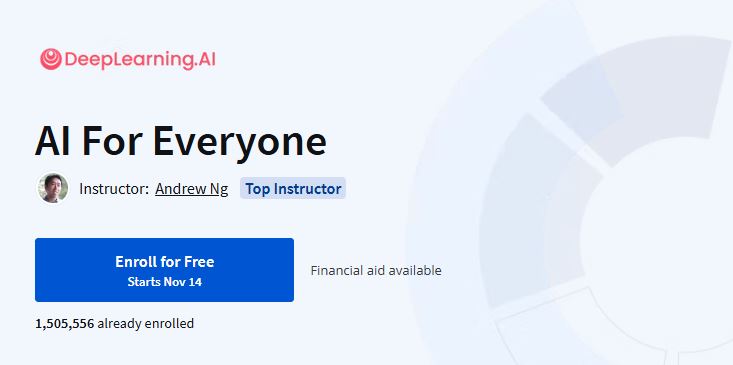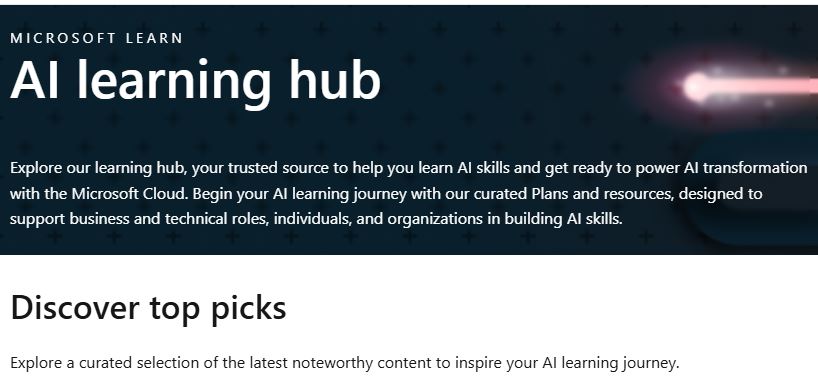Artificial Intelligence (AI) is one of the most transformative technologies of the modern age. From enhancing productivity to revolutionizing entire industries, AI is reshaping the way we live and work. Whether you’re a beginner looking to dive into AI or a seasoned professional aiming to refine your skills, there are numerous courses available to help you stay ahead in the rapidly evolving AI landscape.
In this blog post, we’ll explore 10 of the best AI courses that cater to different levels of expertise. We’ll provide an overview of each course, its key features, pros and cons, and a handy comparison table to help you choose the best one for your needs.

Table of Contents
Toggle1. AI For Everyone (Coursera – Andrew Ng)

This course by Andrew Ng, a co-founder of Coursera and one of the most respected figures in AI, is perfect for those just getting started. It focuses on AI’s impact on society and business, covering key concepts in a non-technical manner.
Key Features:
Introduction to AI concepts and terminology
Ethical considerations and AI’s societal impact
Overview of AI applications in business
Pros:
Taught by a well-known expert in AI
Easy-to-follow with no programming experience required
Free to audit
Cons:
Lacks in-depth technical content
Limited practical hands-on experience
2. Machine Learning (Coursera – Andrew Ng)
This is another top-tier course from Andrew Ng, focusing on machine learning algorithms and how to apply them to real-world problems. It is widely regarded as one of the best beginner-friendly courses for learning AI.
Key Features:
Covers supervised and unsupervised learning
Hands-on exercises using Octave or MATLAB
Focuses on algorithms like regression, clustering, and neural networks
Pros:
Well-structured and easy to follow
Great for beginners to understand core machine learning algorithms
Includes practical coding assignments
Cons:
Programming knowledge of MATLAB/Octave is required
Could be challenging for those without a background in mathematics
3. Deep Learning Specialization (Coursera – Andrew Ng)
For those interested in deep learning, this specialization is an ideal course. It consists of five courses, offering a deep dive into neural networks, convolutional networks, sequence models, and more.
Key Features:
In-depth exploration of deep learning algorithms
Practical applications in computer vision, NLP, and more
Hands-on projects using TensorFlow
Pros:
Comprehensive coverage of deep learning
Includes practical coding and real-world applications
Taught by Andrew Ng
Cons:
Requires prior programming and mathematical knowledge
Might be overwhelming for beginners
4. AI Programming with Python (Udacity)
This Udacity course focuses on AI programming using Python. It teaches foundational AI skills, including Python programming, neural networks, and natural language processing.
Key Features:
Introduction to Python and essential AI libraries (e.g., NumPy, TensorFlow)
Covers neural networks and deep learning
Real-world projects
Pros:
Highly practical and project-based
Focus on real-world applications
Strong focus on Python, a key language for AI
Cons:
Expensive compared to other courses
Requires a basic understanding of Python
Also Read: 10 Best AI Software for Cover Letter Editing in 2024
5. AI and Machine Learning for Business (Udemy)
This course is designed for business professionals who want to learn how AI and machine learning can be applied to solve business problems. It focuses more on the strategic side of AI rather than deep technical skills.
Key Features:
Learn how to integrate AI into business processes
Covers AI use cases in marketing, operations, and finance
Focus on AI project management
Pros:
Perfect for non-technical professionals
Practical business applications of AI
Affordable
Cons:
Lacks deep technical content
Limited hands-on coding experience
6. Artificial Intelligence A-Z™: Learn How to Build an AI (Udemy)

This comprehensive course teaches how to build AI applications from scratch. It covers machine learning, deep learning, and reinforcement learning techniques, providing a solid foundation in AI development.
Key Features:
Covers a wide range of AI topics, including deep learning and reinforcement learning
Hands-on projects with Python
Covers real-world applications in AI
Pros:
Broad and detailed coverage of AI concepts
Practical coding exercises and projects
Affordable
Cons:
Requires a basic understanding of Python and programming
The course is self-paced, which may lack the structure some learners prefer
7. Professional Certificate in AI (edX – Columbia University)
This professional certificate is designed for those who want to get a formal qualification in AI. Offered by Columbia University, it covers the foundations of AI and machine learning, with a focus on problem-solving.
Key Features:
Taught by industry experts from Columbia University
Covers AI fundamentals and applications
Includes hands-on projects using real-world datasets
Pros:
Strong academic backing
Includes high-quality video lectures and assignments
Certificate from a prestigious university
Cons:
Expensive compared to other platforms
Requires a solid foundation in programming
8. Fast.ai – Practical Deep Learning for Coders
Fast.ai’s course is focused on providing practical deep learning skills to developers. It is known for its hands-on, top-down approach, making it easier for developers to get started with real-world AI applications.
Key Features:
Focus on deep learning with a hands-on approach
Uses Python and fastai library
Project-based learning
Pros:
Practical and hands-on approach
Uses high-level APIs for deep learning
Free to access
Cons:
Assumes some programming knowledge
Not ideal for beginners without coding experience
9. Intro to Artificial Intelligence (Udacity)
This Udacity course is a great starting point for those interested in AI but unsure where to begin. It covers the basics of AI, including search algorithms, logic, and decision-making.
Key Features:
Covers fundamental AI techniques and algorithms
Focuses on AI problem-solving
Ideal for absolute beginners
Pros:
Simple and accessible for beginners
No prior programming knowledge required
Free to audit
Cons:
Doesn’t go into advanced topics like deep learning or neural networks
Lacks practical projects
10. Microsoft AI School (Microsoft)

Microsoft’s AI School offers a wide range of resources for learning AI, including self-paced learning paths and hands-on projects. It covers topics like computer vision, NLP, and reinforcement learning.
Key Features:
Includes modules for different AI topics
Focus on practical applications with Microsoft tools
Offers certifications for Microsoft AI
Pros:
Free to access
Focus on Microsoft’s AI ecosystem
Practical and hands-on projects
Cons:
Limited coverage of AI topics outside Microsoft technologies
Might not be suitable for those looking for broader AI knowledge
Best AI Courses at a Glance
| Course Name | Platform | Level | Key Features | Price | Pros | Cons |
|---|---|---|---|---|---|---|
| AI For Everyone | Coursera | Beginner | Intro to AI, Business Applications | Free | Expert-led, No coding | Lacks technical depth |
| Machine Learning | Coursera | Beginner | Supervised/Unsupervised Learning, Algorithms | Free | Strong fundamentals, Well-structured | MATLAB knowledge required |
| Deep Learning Specialization | Coursera | Advanced | Neural Networks, Deep Learning | Paid | Comprehensive, Hands-on | Requires prior knowledge |
| AI Programming with Python | Udacity | Beginner | Python, Neural Networks, NLP | Paid | Practical, Real-world projects | Expensive, Python knowledge required |
| AI & Machine Learning for Business | Udemy | Business | AI applications in business | Affordable | Great for non-tech people | Limited coding |
| AI A-Z: Learn How to Build an AI | Udemy | Beginner-Intermediate | AI projects, Python | Affordable | Broad coverage, Practical | Requires basic Python knowledge |
| Professional Certificate in AI | edX | Intermediate | AI Foundations, Columbia University | Paid | Academic, Hands-on | Expensive, Requires programming |
| Practical Deep Learning for Coders | Fast.ai | Intermediate | Deep Learning, Python | Free | Hands-on, Practical | Assumes coding knowledge |
| Intro to Artificial Intelligence | Udacity | Beginner | AI Algorithms | Free | Simple, Accessible | Lacks advanced content |
| Microsoft AI School | Microsoft | All levels | AI modules, Practical Projects | Free | Free, Microsoft tools | Limited scope |
Final Thought on AI Courses
Choosing the right AI course depends on your current knowledge, learning goals, and budget. If you’re a beginner, courses like Andrew Ng’s AI For Everyone and Machine Learning are excellent choices. For more advanced learners, Deep Learning Specialization or Fast.ai may be more suitable.
No matter which course you choose, investing time in AI education will not only boost your skills but also prepare you for the exciting opportunities in the world of AI.
Interesting Reads
10 Best WordPress Cache Plugins




